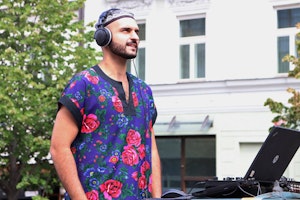The Forgotten History of Romani Resistance
By Pierre Chopinaud

On the evening of May 16, 1944, in the Auschwitz-Birkenau concentration camp, SS guards armed with machine guns surrounded the area of the camp designated for Roma and Sinti prisoners. Their intent was to round up the nearly 6,000 prisoners there and send them to the gas chambers. But when the guards approached the area, they were met with armed resistance from the inmates.
The prisoners had learned of the planned “liquidation” and fashioned weapons from sheet metal, wood, pipes, rocks, and any other scraps of material they could get their hands on. According to the memories of survivors and witnesses to the incident, the inmates forced the guards into retreat, and though some prisoners were shot that night, the act of resistance allowed the Roma and Sinti prisoners to put off execution for several more months.
How can such an epic episode have been lost to history? Who knows about the Sonderkommandos revolt of August 1944? Who knows about Witold Pilecki, who infiltrated Auschwitz to organize its resistance network? Keeping alive the memories of these events could help prevent such crimes from happening again in the future.
This is why La Voix des Rroms is raising awareness around May 16, the Romani Resistance Day in Europe. The Romani Resistance Day represents a change in the way Romani culture and identity appear in public space. This change comes from an understanding of this space as a political one, where a history of resistance replaces a history of oppression. We have urged Romani organizations across Europe to embrace this date: there are several events planned this year in Budapest; Lety (Czech Republic); and Paris, where we are organizing Romani Resistance Day (Fête de l’insurrection gitane) in collaboration with other stigmatized minorities like Muslims and blacks.
For too long, Roma people have been misrepresented by stereotypes: the beggar, the prostitute, the compassionate victim, the folkloric artist. Those stereotypes overshadow the nuances of Romani culture and identity, which have to be the result of political struggle. Romani cultural creation aims to challenge mainstream culture, identity, and representation, just as the African American civil rights movement in the United States changed the whole of America’s identity.
We must do all we can to promote Romani culture and identity. For more than four decades, Europe’s Roma communities have wanted to establish an institution that would give their traditions and creations their own stage. Across Europe, institutions exist to celebrate an array of cultures, nationalities, and identities, but there is nothing of this kind for Roma.
The European Roma Institute, recently proposed by the Open Society Foundations, the Council of Europe, and leading Roma organizations and figures, is a unique way to address this imbalance and give Romani traditions and creations their own stage.
In order to be successful, the European Roma Institute will need to tackle the breadth of Romani culture and identity. A lot has been done in the past to promote Romani culture with the help of an institutional framework, but it failed, in my opinion, because the specificity of Romani culture cannot be expressed using mainstream categories. There are some very specific features of Romani identity and culture that need to be addressed, like Romani humor; among all Roma, there is a common perception of the world, a common distance from society, as is exemplified in Charlie Chaplin movies—whose grandmother was, in fact, a Roma woman from England.
The main challenge of the European Roma Institute will be to deal with the tensions between unity (we are all “Roma”) and multiplicity (we all belong to the “landscape” or the territories we live in). That double belonging has always structured Romani identity. It needs to be fully addressed.
La Voix des Rroms is a grantee of the Open Society Foundations.
Pierre Chopinaud is the director of La Voix des Rroms.


